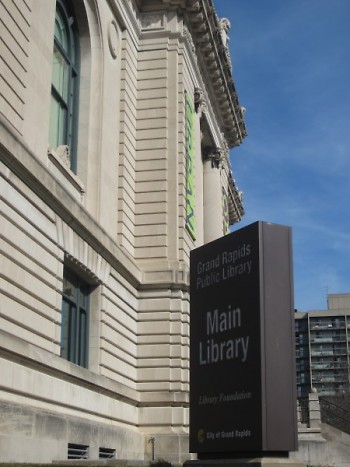The Grand Rapids Public Library has announced it will be cutting staff. The proposed re-budgeting will undergo approval in March, hopefully eradicating $494,199 of expenses. The library is pressing ahead with plans for a digital book-checking system (RFID). It is projected that these changes “will eliminate 13 part-time clerical aides and book-shelvers, and the web branch manager. Also, two other part-time jobs that were cut in January will remain unfilled.”
Thanks to the bottom falling out of the housing market, property tax revenues are down by $1,000,000. Since the library relies on this source of revenue for their operating budget the cuts are yet another bullet point joining the lengthy list of public goods taking a hit.
The library is not the only casualty of ailing public funding. Governor Rick Snyder made deep cuts to education in 2011, and a myriad of cuts have been applied to our social safety net, police force and fire fighters. Furthermore, deep federal cuts will greatly impact Grand Rapids, considering the vast majority of education, child and family services are funded federally.
When I hear comments about these particular cuts, the word “inevitable” often follows. This word invokes the idea that the public sector should behave more like the private sector, and the public goods provided by the public sector that cannot support themselves should be de-funded or secondary to the priorities of the private sector. Certainly quality and efficiency should be expected of any tax funded program. However, the idea that public goods should vary with the market or other economic forces is contrary to the purpose of the public good. Linking the market with the availability of the public good provides a guarantee to the community that services like education, safety nets, unemployment and libraries would be least available when most needed.
The inevitability of a deteriorating public good has me wondering how the loss of these goods will inevitably impact our children – all of our children. What does a community look like when its libraries, schools, parks and child and family services are all being cut and slashed at the same time? Children in Kent County are already facing an uphill battle.
Ask Elise, my 8-year old daughter, about her favorite memory of the Grand Rapids Public Library and she will tell you it was meeting Jonathan Rand, the author of the American Chillers series. She can’t tell you how many books she has read from the library; she will borrow 30 at a time so I’m guessing she has read a whole lot of them.
I am nearly positive that she has already read more books than I have in my lifetime. She read the entire “Boxcar Children” series in the time it took me to read one novel. She has a heck of a head start in her literary life and this will pay massive dividends now and down the road. The Grand Rapids Public Library has a lot to do with that head start.
It is concerning to imagine who these cuts might impact. If we look at a recent 2011 Harris poll, the groups most likely to use the library are working women and working mothers. Furthermore, the library is a vital resource for the unemployed – in particular the virtual branches, as indicated by the Harris report, “The same recession that cut into the funding of many public libraries made them a key resource for people looking for work or seeking to use online government services.”
Almost 80% of those polled thought libraries deserved more funding – yet state aid to public libraries has been reduced by two-thirds since 2000 – well before Snyder’s massive cuts last year. Furthermore, the recent public discourse that focuses on the minute divisions between people only serve to further stymie the preservation of public goods such as libraries. The failure of this discourse and its impending politics will be at the expense of the poor and middle classes.
Are we truly choosing to cash in the public goods that were built by our parents and grandparents? If so, what are we cashing them in for?
Luckily, I don’t see the bottom dropping out fast enough for Elise to suffer too much. It is my other children that I am most worried about. My 6-year-old multiply-impaired daughter is facing a lifetime need of care in a country that has been slashing funding for the disabled for years. I have a 1-year-old son who will probably live a different life than even his oldest sister – one where the libraries may be a little emptier, schools may have bigger classrooms, and the poor have little chance to ever move up.
Inevitability. I hope not.
The Rapidian, a program of the 501(c)3 nonprofit Community Media Center, relies on the community’s support to help cover the cost of training reporters and publishing content.
We need your help.
If each of our readers and content creators who values this community platform help support its creation and maintenance, The Rapidian can continue to educate and facilitate a conversation around issues for years to come.
Please support The Rapidian and make a contribution today.



Comments
Thanks Drew. The bigger question for me is, "if it is time to make cuts, then are we deliberately deciding what our priorities are in this community?" It seems that we make public goods very unimportant if we just afix them to certain funding streams and sail them off into the future. Their importance is then only decided by how endowed that particular funding stream happens to be - it is the tail wagging the dog. However, if things like schools, parks, safety nets or libraries are important, than it follows that the public/political discourse should, at least partly, revolve around what we need to protect in times that are tough.
Jeremy, Thanks for your excellent article and comment. I totally agree that the concept of the common good needs to become a much larger part of public and political discourse. What have you found works best to get more people thinking and talking about the public good, including people who don't read The Rapidian? All the best, Joan Huyser-Honig
Joan - that's a great question. I don't have a great answer. It is one of the reasons why I started writing in The Rapidian - because I felt a need for a shift in the political and economic discourse. There needs to be some bridging of the gap between the very distant political narratives that are shaping among the middle class including the disengaged, the alienated (OWS), more traditional dems and repubs, and more recent Tea Party folks. I do believe the similiarities between these groups are more interesting than the differences, and that discourse needs to start there. Politicians, ideally, would facilitate this kind of discourse. However, party politics exist simply to get people elected - not to spur the political discourse which leaves a big vacuum where good, productive conversation could happen. I recommend writing, voting, and asking people you know what they think about the public good...in the end, our sphere of influence is limited. But if we all work to affect our sphere of influence it will make a difference in how thoughtful the population becomes in the political and economic decisions they make.